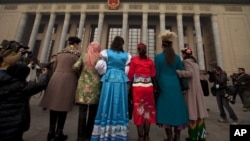Amnesty International says China continues to silence ethnic Uighurs who speak out about human rights abuses allegedly committed three years ago, during deadly riots in the western province of Xinjiang.
The rights group says "dozens, if not hundreds" of Uighurs are still being detained after they "disappeared" in the aftermath of the riots that killed nearly 200 people.
In a report released Thursday, Amnesty says Chinese authorities are intimidating and threatening those who seek information about the whereabouts of their relatives.
The unrest, which began in the regional capital, Urumqi in July 2009, was followed by a series of arrests and prosecutions that rights groups have called arbitrary, as well as a massive security clampdown on the region.
China has since doubled the province's security budget and installed 40,000 security cameras in an attempt to tighten its grip on the resource-rich autonomous province. About two dozen people have been sentenced to death or executed and others were given long jail terms.
The ethnic rioting broke out after Uighurs accused the Chinese government of inaction in the death of a migrant Uighur factory worker in southern China. Violence spilled out onto the streets with scores of innocent Han Chinese settlers attacked by mobs of Uighurs who, in turn, were beaten back by rapidly deployed paramilitary riot police.
Uighur groups say the violence was a reaction against years of unwanted Chinese rule and attempts by Beijing to commit what they call cultural genocide by flooding the region with Han settlers.
The rights group says "dozens, if not hundreds" of Uighurs are still being detained after they "disappeared" in the aftermath of the riots that killed nearly 200 people.
In a report released Thursday, Amnesty says Chinese authorities are intimidating and threatening those who seek information about the whereabouts of their relatives.
The unrest, which began in the regional capital, Urumqi in July 2009, was followed by a series of arrests and prosecutions that rights groups have called arbitrary, as well as a massive security clampdown on the region.
China has since doubled the province's security budget and installed 40,000 security cameras in an attempt to tighten its grip on the resource-rich autonomous province. About two dozen people have been sentenced to death or executed and others were given long jail terms.
The ethnic rioting broke out after Uighurs accused the Chinese government of inaction in the death of a migrant Uighur factory worker in southern China. Violence spilled out onto the streets with scores of innocent Han Chinese settlers attacked by mobs of Uighurs who, in turn, were beaten back by rapidly deployed paramilitary riot police.
Uighur groups say the violence was a reaction against years of unwanted Chinese rule and attempts by Beijing to commit what they call cultural genocide by flooding the region with Han settlers.
